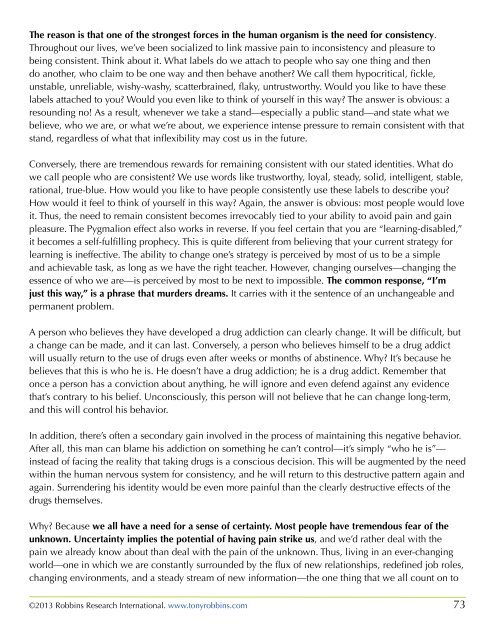Tony Robbins -Re-Awaken_the_Giant_Within
- No tags were found...
You also want an ePaper? Increase the reach of your titles
YUMPU automatically turns print PDFs into web optimized ePapers that Google loves.
The reason is that one of <strong>the</strong> strongest forces in <strong>the</strong> human organism is <strong>the</strong> need for consistency.<br />
Throughout our lives, we’ve been socialized to link massive pain to inconsistency and pleasure to<br />
being consistent. Think about it. What labels do we attach to people who say one thing and <strong>the</strong>n<br />
do ano<strong>the</strong>r, who claim to be one way and <strong>the</strong>n behave ano<strong>the</strong>r? We call <strong>the</strong>m hypocritical, fickle,<br />
unstable, unreliable, wishy-washy, scatterbrained, flaky, untrustworthy. Would you like to have <strong>the</strong>se<br />
labels attached to you? Would you even like to think of yourself in this way? The answer is obvious: a<br />
resounding no! As a result, whenever we take a stand—especially a public stand—and state what we<br />
believe, who we are, or what we’re about, we experience intense pressure to remain consistent with that<br />
stand, regardless of what that inflexibility may cost us in <strong>the</strong> future.<br />
Conversely, <strong>the</strong>re are tremendous rewards for remaining consistent with our stated identities. What do<br />
we call people who are consistent? We use words like trustworthy, loyal, steady, solid, intelligent, stable,<br />
rational, true-blue. How would you like to have people consistently use <strong>the</strong>se labels to describe you?<br />
How would it feel to think of yourself in this way? Again, <strong>the</strong> answer is obvious: most people would love<br />
it. Thus, <strong>the</strong> need to remain consistent becomes irrevocably tied to your ability to avoid pain and gain<br />
pleasure. The Pygmalion effect also works in reverse. If you feel certain that you are “learning-disabled,”<br />
it becomes a self-fulfilling prophecy. This is quite different from believing that your current strategy for<br />
learning is ineffective. The ability to change one’s strategy is perceived by most of us to be a simple<br />
and achievable task, as long as we have <strong>the</strong> right teacher. However, changing ourselves—changing <strong>the</strong><br />
essence of who we are—is perceived by most to be next to impossible. The common response, “I’m<br />
just this way,” is a phrase that murders dreams. It carries with it <strong>the</strong> sentence of an unchangeable and<br />
permanent problem.<br />
A person who believes <strong>the</strong>y have developed a drug addiction can clearly change. It will be difficult, but<br />
a change can be made, and it can last. Conversely, a person who believes himself to be a drug addict<br />
will usually return to <strong>the</strong> use of drugs even after weeks or months of abstinence. Why? It’s because he<br />
believes that this is who he is. He doesn’t have a drug addiction; he is a drug addict. <strong>Re</strong>member that<br />
once a person has a conviction about anything, he will ignore and even defend against any evidence<br />
that’s contrary to his belief. Unconsciously, this person will not believe that he can change long-term,<br />
and this will control his behavior.<br />
In addition, <strong>the</strong>re’s often a secondary gain involved in <strong>the</strong> process of maintaining this negative behavior.<br />
After all, this man can blame his addiction on something he can’t control—it’s simply “who he is”—<br />
instead of facing <strong>the</strong> reality that taking drugs is a conscious decision. This will be augmented by <strong>the</strong> need<br />
within <strong>the</strong> human nervous system for consistency, and he will return to this destructive pattern again and<br />
again. Surrendering his identity would be even more painful than <strong>the</strong> clearly destructive effects of <strong>the</strong><br />
drugs <strong>the</strong>mselves.<br />
Why? Because we all have a need for a sense of certainty. Most people have tremendous fear of <strong>the</strong><br />
unknown. Uncertainty implies <strong>the</strong> potential of having pain strike us, and we’d ra<strong>the</strong>r deal with <strong>the</strong><br />
pain we already know about than deal with <strong>the</strong> pain of <strong>the</strong> unknown. Thus, living in an ever-changing<br />
world—one in which we are constantly surrounded by <strong>the</strong> flux of new relationships, redefined job roles,<br />
changing environments, and a steady stream of new information—<strong>the</strong> one thing that we all count on to<br />
©2013 <strong>Robbins</strong> <strong>Re</strong>search International. www.tonyrobbins.com 73


